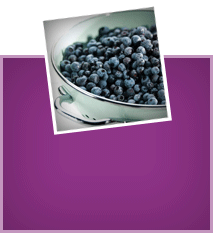Although taste and versatility may be your first reasons to choose Wild Blueberries, their health and nutritional benefits cannot be ignored. Wild Blueberries really do live up to their reputation as a “Superfruit”. Excitement about the health benefits of Wild Blueberries began about 20 years ago when the high anthocyanin content of these little blue fruits garnered the attention of researchers studying food and health. Scientific research since then continues to reveal the ways that Wild Blueberries can protect our health.
Brain Health
![]() Wild Blueberry pigments help to keep blood vessels healthy to support oxygen and glucose delivery to the brain. They can also mitigate inflammation. These benefits help the brain to stay healthy and sharp. In highly controlled studies testing older adults, memory and other aspects of cognition were improved after Wild Blueberry intake.
Wild Blueberry pigments help to keep blood vessels healthy to support oxygen and glucose delivery to the brain. They can also mitigate inflammation. These benefits help the brain to stay healthy and sharp. In highly controlled studies testing older adults, memory and other aspects of cognition were improved after Wild Blueberry intake.
In recent Wild Blueberry studies examining brain function, school-aged adolescents showed better cognitive performance after they consumed Wild Blueberries. These cognitive tests examined aspects of memory, mood and decision making. Results were compelling because young brains are not affected by age and stress like those of elderly adults. Also very notable was that cognitive benefits were seen as soon as 2 hours after intake, whereas other studies test cognition after several week of blueberry feeding. Related research entries »
Cancer
![]() A good deal of research is focused on the cancer prevention potential of Wild Blueberry compounds. Researchers investigating breast cancer include Lynn Adams, Ph.D. and her team at Beckman Research Institute of City of Hope, Duarte, CA, who have demonstrated the potential of blueberries to inhibit the growth of Triple Negative Breast Cancer (TNBC), a particularly aggressive and hard to treat form of breast cancer. Related research entries »
A good deal of research is focused on the cancer prevention potential of Wild Blueberry compounds. Researchers investigating breast cancer include Lynn Adams, Ph.D. and her team at Beckman Research Institute of City of Hope, Duarte, CA, who have demonstrated the potential of blueberries to inhibit the growth of Triple Negative Breast Cancer (TNBC), a particularly aggressive and hard to treat form of breast cancer. Related research entries »
Heart Health
![]() Eating more blueberries is associated with a reduced risk of heart attack and high blood pressure, based on epidemiological studies that examine the diet and health of large populations over many years. More detailed research shows that blueberries contribute to a healthy circulation system by keeping blood vessels more pliable. This effect leads to improved blood flow and makes the circulatory system more responsive to the body’s needs for oxygen and nutrient delivery. Related research entries »
Eating more blueberries is associated with a reduced risk of heart attack and high blood pressure, based on epidemiological studies that examine the diet and health of large populations over many years. More detailed research shows that blueberries contribute to a healthy circulation system by keeping blood vessels more pliable. This effect leads to improved blood flow and makes the circulatory system more responsive to the body’s needs for oxygen and nutrient delivery. Related research entries »
Diabetes
![]()
Greater intake of blueberries is associated with a reduced risk of type 2 (late onset) diabetes, based on diet and health history of large, diverse populations, over many years. One way that Wild Blueberries can help to regulate blood glucose levels is by maintaining or improving the body’s ability to respond to insulin. Related research entries »
Metabolic Syndrome
![]() Metabolic syndrome is a relatively new medical term which encompasses health conditions related to the risk of cardiovascular disease, diabetes and obesity. Conditions include elevated blood cholesterol, blood pressure, blood glucose, abdominal obesity, and systemic inflammation. These conditions increase the risk for health complications, including dementia. Wild Blueberries and their anthocyanin pigments protect against metabolic syndrome by supporting heart health and blood sugar regulation. Eating more blueberries is also associated with less body weight gain based on long-term population studies. Related research entries »
Metabolic syndrome is a relatively new medical term which encompasses health conditions related to the risk of cardiovascular disease, diabetes and obesity. Conditions include elevated blood cholesterol, blood pressure, blood glucose, abdominal obesity, and systemic inflammation. These conditions increase the risk for health complications, including dementia. Wild Blueberries and their anthocyanin pigments protect against metabolic syndrome by supporting heart health and blood sugar regulation. Eating more blueberries is also associated with less body weight gain based on long-term population studies. Related research entries »
Pigment Power
![]() We now know that the abundant blue pigment in Wild Blueberries contributes a lot to their health benefits. Wild Blueberries are one of the richest sources of these pigments called anthocyanins (“antho” means flowering plant; and “cyanin” means blue). Wild Blueberries are so rich in anthocyanin pigments that a daily serving of about 40 g (approximately 1/3 cup) has been associated with health benefits. Related research entries »
We now know that the abundant blue pigment in Wild Blueberries contributes a lot to their health benefits. Wild Blueberries are one of the richest sources of these pigments called anthocyanins (“antho” means flowering plant; and “cyanin” means blue). Wild Blueberries are so rich in anthocyanin pigments that a daily serving of about 40 g (approximately 1/3 cup) has been associated with health benefits. Related research entries »










